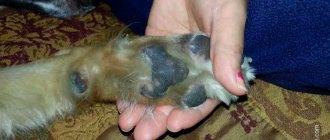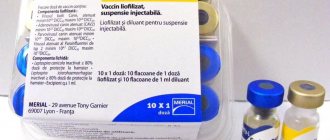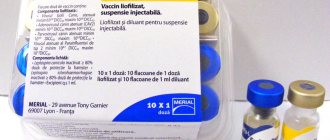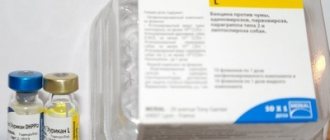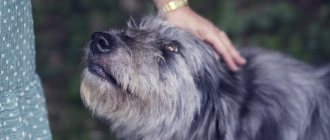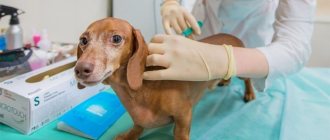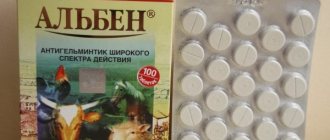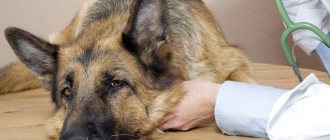Classification of vaccines Complications after vaccination Which vaccines are best to use Vaccines with unproven or low effectiveness Vaccines for dogs are a biogenic preparation containing weakened or killed pathogens of infectious diseases. Vaccination is currently the best way to prevent infectious pathologies that are difficult to treat (or cannot be treated) in dogs and puppies. Conventionally, thanks to vaccination, the dog’s immune system becomes familiar with the pathogen that causes the disease (virus), recognizes and remembers it, as a result, when the pathogen re-enters the body, it quickly copes with it before symptoms of the disease develop. If a pathogen enters the body of an unvaccinated dog, then the immune system spends time recognizing the infection and begins to defend itself too late.
Description of the complex vaccine
Manufacturer and purpose
The drug belongs to vaccines against distemper and rabies, intended for dogs of various breeds. It was created by a company from France called Merial.
The medication is available in the form of a suspension for injection. Consists of 2 components – lyophilized (DHPPI2-L) and liquid (LR).
The vaccine is intended to build immunity in dogs against certain types of diseases such as plague, infectious hepatitis, parvovirus, parainfluenza, adenovirus infection, and rabies.
The drug has no harmful effects. Not intended for treatment.
Vaccination is carried out only in healthy animals that do not suffer from a parasitic infection.
DHPPI2, L and LR
There are 2 types of medication - L and LR. The first type of vaccine acts as a prophylactic against carnivore distemper, parvovirus, adenovirus and parainfluenza. It also helps develop immunity against leptospirosis.
LR is considered an extended version of Eurikan. This vaccine helps prevent the development of rabies.
A vaccine called Eurican R has not yet been developed.
Primo
Eurican Primo is a high titer monovalent vaccine designed to protect puppies against parvovirus enteritis. Its effect is aimed at overcoming the barrier created by maternal antibodies and reducing the immune gap.
When should you refuse vaccination?
Despite the fact that Eurican is considered a safe drug, after its use the development of a number of side effects cannot be ruled out, due to which the drug has a number of limitations.
The medicine is absolutely contraindicated in the following situations:
individual intolerance to components;- the period of gestation of puppies, regardless of the stage of pregnancy;
- if less than ten days have passed after treatment for worms;
- age up to three months in case of introduction of the LR version, or up to seven weeks when using the drug with the L mark.
Dogs that are severely emaciated due to an acute or chronic pathological process are not allowed to be vaccinated, since during this period the animal is severely weakened. Also, vaccinations should not be given immediately after viral infections, even in the absence of characteristic clinical manifestations.
Immunization should be refused if the drug is expired or sediment and foreign impurities are found in it.
Composition and expiration date
Eurikan has 2 components. The first of them is produced in dry form and resembles a porous mass . Characterized by a yellowish or beige tint. The composition includes strains of dangerous infections: parvovirus, adenovirus, plague and parainfluenza of the second type.
Also, the dry component consists of polypeptides and glucides, which act as stabilizers.
The second component is the liquid component . Available in the form of a cloudy solution. After long-term storage it becomes transparent, and sediment forms at the bottom.
Leptospire has been added to the liquid. If the LR option is presented, then the drug is enriched with rabies viruses.
The components of the medication are packaged in different bottles. Their volume is 1 ml. Before vaccination they are mixed with each other.
The medicine is stored at a temperature of +2...+8°C in a dry and dark place. Eurican is valid for 2 years from the date of manufacture.
Negative sides
Since the drugs are made from natural components - live weakened or killed strains of pathogens, special attention should be paid to the storage of vaccines. The dry part of the medicine is stored only separately from the diluent, placing both components in a dark, cool place (4 - 8 ° C), isolated from humidity. The date until which the medication can be stored is indicated by the manufacturer on the bottles and box - the drugs do not have long shelf life.
Vaccines cannot be stored in diluted form; the medication must be used immediately after combining the dry part with the diluent. Otherwise, the mixture is disposed of. There are also a few more disadvantages: there is a low probability of side effects due to individual intolerance - swelling or swelling in the place where the drug was administered, short-term general weakness, malaise.
The need to comply with quarantine after the vaccine, since immunity is developed within 1 - 2 weeks after the drug is administered to the body. It is forbidden to bathe after the vaccination procedure for 5 - 7 days. Minimum shelf life when diluted (no more than half an hour).
Vaccination is carried out exclusively for healthy dogs, having previously undergone deworming (treatment against worms), treatment against external parasites and after consulting a veterinarian.
Instructions for use
Scheme and dosages
The vaccine is administered to puppies in an amount of 1 ml, regardless of weight and age. After the first injection, the drug is used again after 3-5 weeks. After this, vaccination is recommended every year. Animals under 7 weeks of age are administered the drug Eurican DHPPI2-L.
A vaccine containing the rabies virus is given to pets older than 3 months. If the first option was chosen, then the rabies vaccination is given after 6 months.
When using the vaccine, you must adhere to some rules:
- The liquid part of the drug is shaken in the bottle.
- After this, the rubber stopper is pierced with a syringe and a needle, and the liquid component is drawn into it.
- The suspension is introduced into the bottle containing the dry contents. You cannot open the cork, just make a puncture.
- Shake well until the components are completely dissolved. The prepared composition is drawn into the syringe.
Vaccination is carried out every year. Skipping vaccinations is not recommended.
How and where to inject?
The injection is administered subcutaneously into the scapular region or intramuscularly into the femoral region. The injection site is first treated with ethyl alcohol.
Food intake does not affect the administration of the drug, so the pet can be fed before vaccination.
How to prepare a puppy/dog
In order for the procedure to be successful and not cause a negative reaction after the first vaccination, you must adhere to some rules:
It is recommended to perform vaccination only in specialized institutions. Vaccinations made must be included in the dog’s veterinary passport, which will not create any difficulties in the future when traveling abroad.- Injections are only allowed on animals without pathological abnormalities. If your pet is unwell, the procedure will have to be postponed. Immunization is also not recommended during puppy teething.
- Approximately 14 days before the procedure, the animal is dewormed and treated for fleas. This measure is necessary, since the parasites present in the animal’s body, capable of releasing toxic substances, weaken the protective functions of the four-legged animal.
- The drug can trigger the development of allergies, so the dog needs to be given a drug of the anti-allergy group. This could be Suprastin, Diphenhydramine, etc.
3-4 hours before vaccination it is necessary to measure the animal’s body temperature. In a healthy state, indicators should be within +37…+39 °C.
Reviews from owners and veterinarian
Elena, spaniel owner, Zheleznogorsk:
“My daughter has wanted a dog for a long time. But I knew that the pet needed special care. I bought a spaniel puppy from a friend. At 12 weeks, the Eurican vaccine with rabies viruses was used for the first time. No side effects were observed. Now we vaccinate our pets every year.”
Victor, owner of a French bulldog, Kaluga:
“The dog is already 5 years old. For the first time, Nobivak was used for immunization. When the next vaccination came, the drug was not available in either the pharmacy or the veterinary clinic. They suggested Eurikan LR, which contains rabies viruses.
After 2 days, a large lump appeared at the injection site. The dog could not walk, so he slept constantly. Everything went away in just 1.5 weeks.”
Ulyana Petrovna, veterinarian, Vladivostok:
“I believe that Eurican is one of the best drugs for vaccinating an animal against dangerous viruses. Vaccinations begin in early childhood, and then continue every year. Side effects are rare. Always on sale."
Answers to frequently asked questions
Is it possible to vaccinate a dog with Eurican yourself?
No, any vaccinations can only be administered by a veterinarian. You yourself cannot be sure of the quality of the serum, its correct administration, or the absence of infectious diseases in your pet.
Is it allowed to vaccinate a dog at home?
Yes, if it is done by a veterinarian. At the same time, he must bring the vaccine in a cooling box: in the heat, the serum loses its properties.
This is my first time giving this vaccine to a puppy/dog. I'm afraid of an allergic reaction. How can it be prevented?
The simplest preventive measure is to give an injection with an antihistamine before administering the serum. But usually this is not necessary: Eurican is well tolerated, and minor allergic reactions go away on their own. If you are afraid of anaphylactic shock, sit in the clinic lobby for 30 minutes: if alarming symptoms do not appear during this time, they will not appear in the future. And if acute conditions develop, the doctor will be able to quickly respond and stop them.
Is it necessary to treat a dog for parasites before vaccination? How to do this correctly?
Yes, since helminths, ticks and fleas carry dangerous diseases, can infect the animal, and reduce immunity. For preventive purposes, dogs are treated once 10 days before vaccination, for therapeutic purposes - twice with an interval of 7-10 days, the last treatment is carried out no later than 1.5 weeks before vaccination. They use medications against ticks and insects together with anthelmintic tablets or complex products.
What's better instead?
Nobivak
The Nobivak vaccine has several types:
- Nobivak Puppy DP . Protects against plague and parvovirus enteritis. Used for puppies at 6 weeks.
- Nobivac DHPPi . Intended for vaccination of adult and small dogs over 10 weeks of age.
- Nobivak for rabies and leptospirosis . Often used in combination.
- Nobivak KS . Helps against parainfluenza and bordetellosis.
Immunization is carried out annually. The drug is administered in a dosage of 1 ml, regardless of the weight and age of the pet. The medicine will cost 190-210 rubles. The price is less than its analogue.
Nobivak is an effective remedy, but it is becoming more difficult to find in pharmacies. Therefore, the choice often stops at Eurikan. It is not recommended to mix components with each other. But if one vaccine is not suitable, next time it can be replaced with another.
Rabizin
Rabizin is a non-live vaccine and is intended for prevention against rabies. Available in the form of a clear solution. Does not require mixing with other components. 14-21 days after the injection, the dog develops full immunity, which lasts for 3 years.
Rabisin is better than Eurikan in that it is used for the prevention of dogs during pregnancy and lactation. The minimum age for the first vaccination is 12 weeks.
Rabizin is cheaper than Eurican. The price for a bottle with 1 dose is 140 rubles. But Eurikan allows you to avoid infection with plague viruses, enteritis, and adenovirus.
Mixing medications is not recommended, as the risk of side effects increases.
Other analogues
Eurikan has other analogues:
- Rubix. A cheap product, the cost of which is 40-50 rubles. Protects against rabies. Immunization is carried out once every 3 years.
- Biocan R. Refers to complex drugs, as it protects against rabies and leptospirosis. The immune response occurs after 40 days. It is prohibited to give injections to dogs with elevated temperatures, injuries or parasitic infestations. The average cost is 370 rubles.
- Multikan-8. Refers to structural analogues of Eurikan. Protects against plague, adenovirus, coronavirus, rabies and leptospirosis. It has 2 components - dry and liquid substances. The volume of the injected solution is 3 ml. Prescribed intramuscularly. Price – 252 rubles.
Which drug to choose is worth asking your veterinarian . The choice depends on the individual characteristics of the animal.
Eurican is an effective and inexpensive remedy for preventing the development of dangerous pathologies in dogs. The medication is well tolerated by both puppies and adult dogs. Injections are given to pets of different breeds. Preventive manipulations must be carried out in a veterinary clinic under the supervision of a doctor.
Complications after vaccination
We said above that complications may occur after using vaccines. According to various sources, the incidence of complications, including minor ones, after vaccination ranges from 40 cases per 10,000 dogs to approximately 1% of all vaccinated animals.
Most often, the consequences can be as follows:
- a seal at the vaccination site; sometimes dogs, especially puppies, react painfully to touching this seal. Normally, it goes away within a few days and does not pose any danger;
- a temporary increase in temperature (for a day) caused by the reaction of the immune system to a foreign protein. This rise in temperature is often associated with lethargy and lack of appetite. If this condition does not go away within 24 hours after vaccination, it is recommended to consult a doctor;
- allergic reaction - occurs with individual sensitivity to the components of the drug, and can manifest itself in the form of swelling and rash. Most often it appears in the first minutes after vaccination, so the doctor at the clinic can immediately take action.
- unformed immunity - in case of non-compliance with the vaccination schedule, violation of the storage and use technology of vaccines (in particular, when half the dose is used in vaccinations of small breed puppies, which is a gross violation), as well as in the case of certain genetic disorders, an immune response to vaccination may not be formed. Some dogs have a congenital genetic disorder that prevents the formation of strong immunity after vaccination. This pathology has a breed predisposition (Rottweilers, Dobermans). It is possible to determine whether a response to vaccination is developing by conducting serological testing. Dogs with this genetic disorder must be removed from breeding.
Most often, the cause of complications is in the inert fillers contained in the vaccine, as they contain foreign proteins. Some data suggest that inactivated vaccines are more likely to cause complications than live vaccines, but this is currently unconfirmed.
